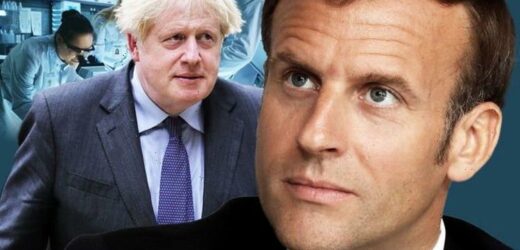Macron criticised for ‘snubbing’ France in favour of EU
We use your sign-up to provide content in ways you’ve consented to and to improve our understanding of you. This may include adverts from us and 3rd parties based on our understanding. You can unsubscribe at any time. More info
France has announced that the European technology fund is due for launch on Tuesday. The plan is for the EU’s tech sector to one day rival its competitors in the US and Asia. French Finance Minister Bruno Le Maire said the fund will combine 10 to 20 funds “at a minimum value of €1billion to finance tech champions”. Mr Le Maire added: “Our ultimate target is to have 10 technology companies worth more than 100 billion euros each by 2030.”
Currently, the EU accounts for only 7 percent of aggregate global tech market cap.
North America on the other hand accounts for 71 percent.
The announcement comes after France recently took hold of the EU Presidency.
But it also comes after Britain unveiled a masterplan to help it become a science superpower.
Britain, which has been banned from joining an £80billion EU research and innovation project, is poised to instead partner with countries outside the EU in a £6billion alternative.


The UK was supposed to contribute £15billion to Horizon Europe over a seven-year period so its scientists could collaborate with European partners.
But after being banned over Brexit disputes, British scientists may be able to collaborate with “better” partners.
Science Minister George Freeman told the Financial Times: “If our Association continues to be blocked, we cannot allow UK science to suffer through EU politics.
“So, I am developing a £6billion Global Britain Science Plan.”
And part of the plan looks like it will involve collaborating with Britain’s Five Eyes partners.

Five Eyes is an Anglosphere alliance consisting of Australia, Canada, New Zealand, the US and the UK.
But not just limited to these countries, Mr Freeman hopes to partner with countries across the globe with strong science sectors, like Japan.
And while British scientists were left in the dark for months, fearing they may miss out on key funds and valuable partners, they may now have even better partners to work with.
Mr Freeman, speaking to the Science and Technology Committee last week, agreed with analysis that universities in the US, Australia and Asia are of “better quality” than our European partners.
And the Science Minister headed to Geneva today to look at partnering up with Switzerland, which has also been banned from the project by the bloc.
Mr Freeman said: “The UK and Switzerland are science powerhouses with huge, shared research interests.
DON’T MISS
Britain flying after Brexit: R&D funding to soar to record levels [REPORT]
Sea level rise crisis as UK expert warns: ‘Not if, when!’ [REVEAL]
Archaeologists left horrified by grim Roman-era burial [INSIGHT]

“Between us, we have nine out of 10 of the top Universities in Europe.”
And British scientists have already been collaborating of their Five Eyes partners.
Offering a snippet of what his “Plan B” might look like, Mr Freeman handed 12 projects a £17million investment with help from the Engineering and Physical Sciences Research Council (EPSRC), part of UK Research and Innovation (UKRI).
The Internet of Energy (IoE) is one of those projects.
It is being led by Prof Rajiv Ranjan from Newcastle University and Prof Omer Rana from Cardiff University.

Their project was handed £1.5million in EPSRC funding and involves a partnership with Commonwealth Scientific and Industrial Research Organisation (CSIRO) in Australia.
Prof Ranja told Express.co.uk: “It is a good approach to look for partners outside of the EU, not to just restrict ourselves to European partners.
“I believe after working with Australia and other places that they [the EU] are missing a research culture or research excellence, they don’t really inform top scientific publication or top scientific fact the way other countries like the US, Hong Kong and Singapore.”
Source: Read Full Article


